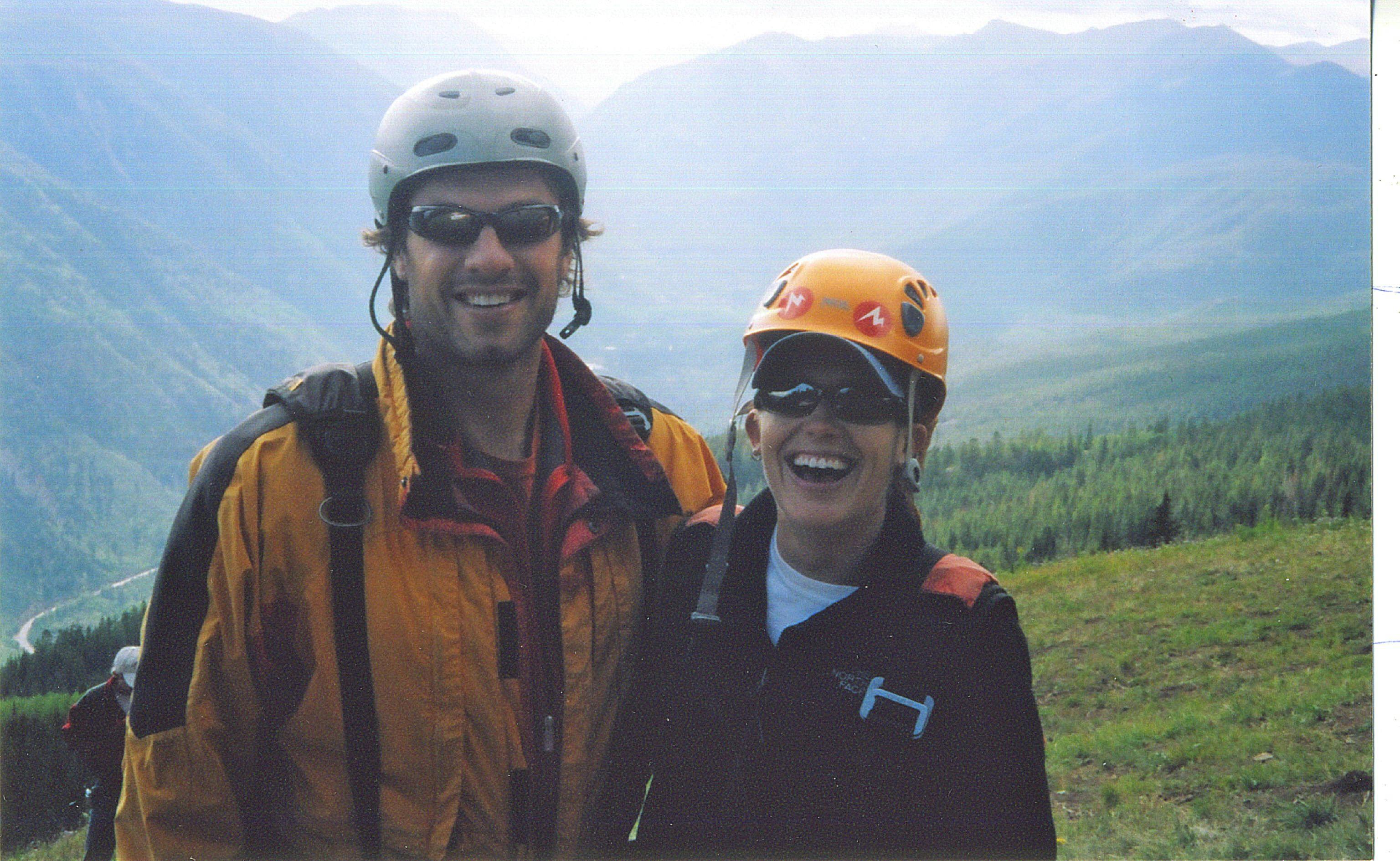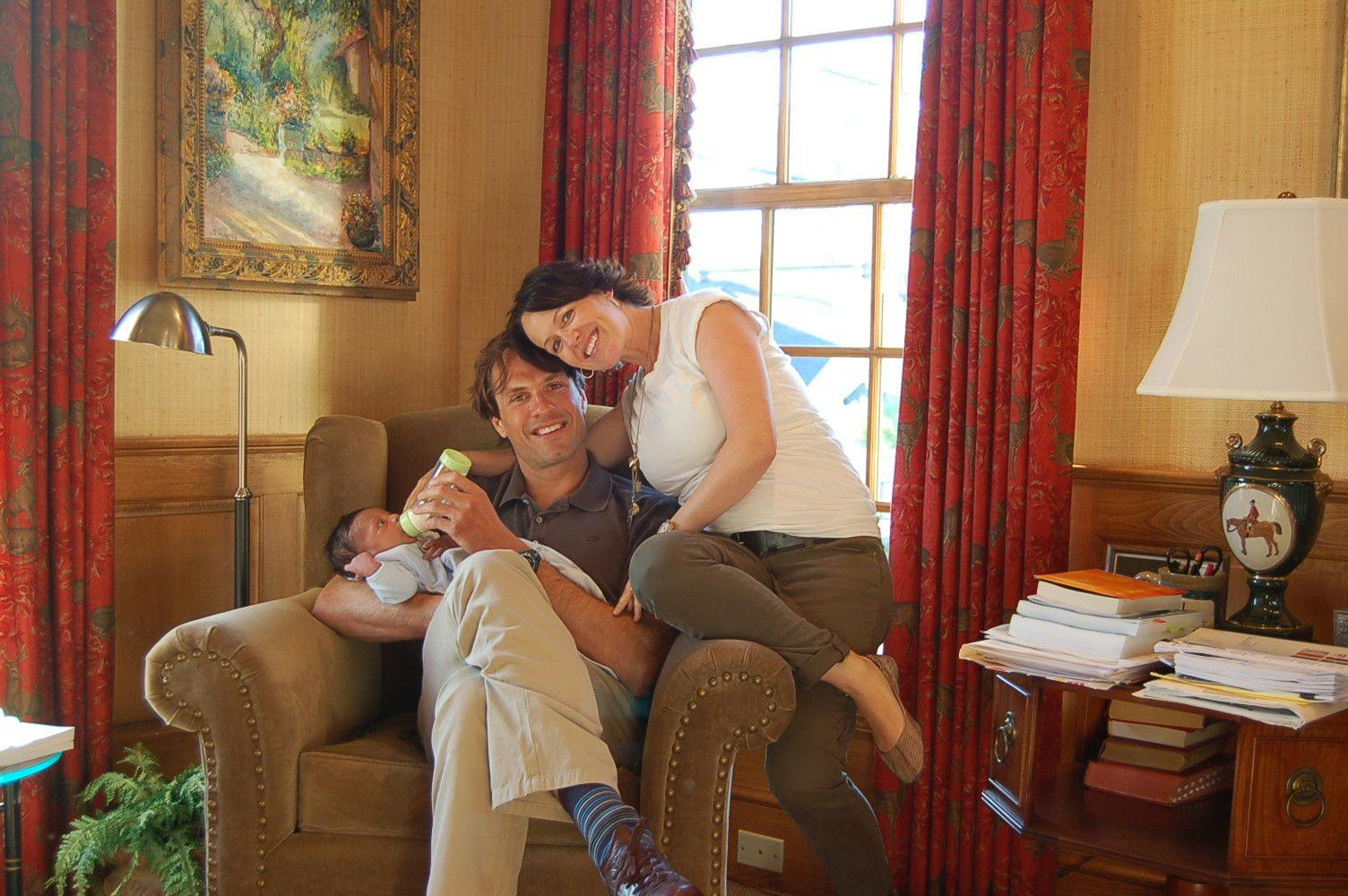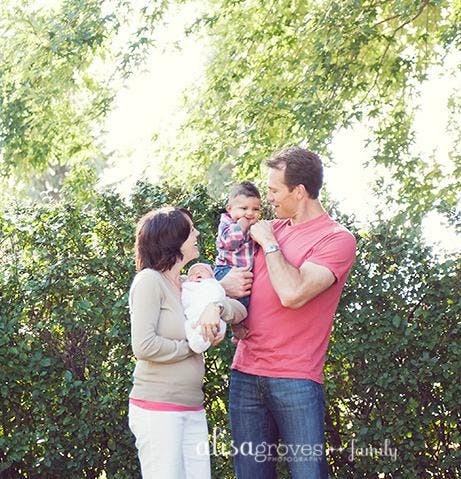MORE IMPORTANT THAN STANLEY: PARENTHOOD
By Jason Gregor
12 years ago
Most Canadians at some point in their lives have dreamt about being in the NHL. Whether it was through your own eyes, the eyes of a parent as you took your child to a 6 a.m. practice, or even as your infant sits on your lap while you watch Hockey Night in Canada, most of us have fantasized about being directly involved in the NHL.
Often we watch those who have accomplished the near-impossible dream and wish we had their life – millions of dollars, millions of fans and seemingly no real-life issues.
However, no amount of money and fame can protect you from the harsh realities of life.
Jason Strudwick (Halloween costume above) spent 13 years in the NHL playing for the Islanders, Canucks, Blackhawks, and Rangers before finishing his career with his hometown Oilers this past April.
This summer, he and his lovely wife Schoena (above as well), welcomed me into their home, and their life, and told me a story of love, heartache, self-doubt, perseverance and hope. It’s about a journey that most of us assume is inevitable in our lifetime, however, unfortunately many of us never get a chance to complete it.
THE BEGINNING
Schoena Johnson was raised in Elk Mountain, Wyoming, population 109, with one paved road and three surnames: Johnson, Jones and Palm. She grew up showing pigs, shooting rifles and chasing after her two older brothers.
Jason grew up in Edmonton. He was an honour student at Archbishop MacDonald High School, played basketball, loved and tortured his younger sister and at 18 he skated off to Kamloops to chase the NHL dream.
Ten years later he was living the dream, and he was introduced to his dream woman.
MEETING
“Friends of his and friends of mine were oddly enough acquaintances,” said Schoena explaining how their romance began courtesy of a fluke conversation in St. Louis.
Tyson Nash was in St. Louis playing for the Blues, Tracie, Schoena’s friend, was a photographer from Chicago and she was in St. Louis taking pictures of Nash’s family. She casually mentioned she was going to Chicago. Nash told her about his buddy, Jason, in Chicago, and they thought the two should meet.
Schoena was a nanny in Chicago and Jason was playing for the Hawks so both were pretty busy. They spoke on the phone for a month before they had time to meet face-to-face. Their first meeting was Sunday evening of SuperBowl XXXVII at Stanley’s Liveband Karaoke Bar.
FIRST IMPRESSIONS
“He was tall,” said Schoena with a tone that hinted of trepidation.
“Her heart stopped,” shrugged Jason. “Pretty much the same effect on everybody…You know how they say ‘the world stood still’ well that was it,” he said trying to keep a straight face.
“I wouldn’t say my heart stopped,” laughed Schoena. “But he was good looking. When I first heard him laugh I thought he was a little light in the trunks (laughs).”
For a big man Jason has a, how can I say this, unique high-pitched laugh. After their usual playful barbs they answered honestly.
“It was a good first impression. We both had similar personalities and that was the initial attraction,” said Jason. “There was so much buildup on the phone, we got to know each other over the phone and that made the first meeting much more relaxed,” Schoena replied.
Interestingly enough, she never googled him prior to their first encounter so neither really knew what the other looked like. Their love was forged on each other’s inner beauty and that foundation ultimately led them down a twisting windy road of love filled with many turns, hills, potholes and a few blown tires.
After a three-year courtship, they were married on July 8th, 2006. They were both 30 years old and planned to start a family right away. After being a nanny for 13 years, where she met some wonderful families and loved many children, Schoena was ready to raise her own.
Unfortunately for them having kids naturally wasn’t going to be easy.
“We tried naturally for about seven months, and then we got tested just to see if there was an issue to rule it out or rule it in,” Jason said.
“We wanted to see what we were up against,” added Schoena.
THE JOURNEY BEGINS

Growing up many of us envision getting married, having children, watching them grow and then hopefully enjoying grandchildren. Sometimes the order gets switched up a bit, but thoughts of procreating seem a natural part of our DNA.
Being told we have fertility issues is not part of the plan.
“At first they (doctors) thought it was my issue,” said Jason. “Obviously that was quite upsetting, but I tried not to focus on it too much, and we felt we could deal with it.”
The male ego can be fragile, especially when you discuss virility. It hits even harder when the recipient is a professional athlete who prides himself on being in elite physical condition, but his diagnosis turned out to be a positive.
“It turns out it (fertility issue) was the other way,” said Jason. “It might sound strange, but being misdiagnosed was a bit of a blessing. I had a sense of what Schoena was feeling because I went through it for a short time, and I think that allowed me to understand a bit what she was feeling.”
“When we found out it was me we were with the Rangers and we were at a clinic in New York,” Schoena explained. “That’s probably our only regret… We went into it trusting that the doctors in this clinic would take care of us. We didn’t ask any questions, we just assumed whatever they said was true.
“Looking back on our file, it was black and white what we were going through in New York. Had we caught on to the fact that my issue was Premature Ovarian Failure, (premature menopause) maybe we could have gotten pregnant on our own sooner, because the treatments could have been more aggressive.”
“We were a bit naïve,” Jason chimed in. “Obviously experience teaches you things…We had done our research, but I don’t think we really realized what went into the entire process. We probably should have asked more questions, but I think most of us assume that the doctors know what is best.”
“I hate to say it, but in this particular clinic it was more like a business. It was absolutely a business. I would walk into the waiting room and I was one of 55 women and you felt like you took a ticket at a deli counter,” said Schoena.
HELLO IVF…IN VITRO FERTILIZATION
“My first round of IVF was in March of 2007,” said Schoena.
“We did three rounds of artificial insemination and the doctor missed my ovulation two out of three times. One time I went in with my friend, a nurse who knew how to read the ultrasounds, and she said to the doctor ‘She’s already ovulated,’ and he replied, ‘Oh yes, but there is a window of opportunity and it will still work.’ Well there isn’t a window and it didn’t work.”
Schoena never sounded angry or upset recalling these unfortunate situations, but she wanted to share these parts of her journey with the hope that some women, or men, might be able to avoid the same fate.
The IVF process is very draining emotionally and physically, but Schoena endured it on three separate occasions because she was determined a baby was in their future.
“You basically start with one injection that shuts your system down so they can manipulate your system. Then you start another injection that does the opposite, it pumps you up so you produce more eggs. Then you go on another injection that keeps you from ovulating, then they monitor it and watch your follicle size and once it gets big enough they give you an injection to make them drop. Then you go for surgery and they do a follicle retrieval (retrieve the eggs) and then combine them with the sperm.
“For round one from start to finish I was on injections from two to four weeks – it depended how I stimulated to the injections. Once they retrieve the eggs it is a five-day wait, and then you go in for the embryo transfer (put the embryo in you) and then it is another ten days until your pregnancy test.”
She never got pregnant, and only learned a few years later why she had struck out.
“I just wish I’d known to look for FSH (follicle stimulating hormone) levels – a major thing you look for in women over the age of 27 or 28,” she said. “FSH basically tells you the quality of your eggs. Fifteen is usually considered infertile. In New York mine were already at an eleven and twelve, but I didn’t know what that meant.
“A year and a half later when I was in our clinic in Vancouver my doctor told me we were dealing with high levels of FSH. Up until then I never knew that is what we were supposed to be looking for.”
While Schoena struggled to understand what was wrong with her, Jason was going through a challenge of his own.
MAKING A DEPOSIT

Anyone who has played hockey past peewee has seen their fair share of dressing room antics, many of them involving naked teammates, but even 17 years of pro and WHL hockey couldn’t prepare Jason for his first sperm donor encounter.
“The first time you are pretty bashful to be honest,” Jason said blushingly. “It is very uncomfortable. When you are done you drop it off to some lab tech”…Schoena interrupts laughing, “And she was probably hot.” “I couldn’t tell you, I was sweating so bad,” laughed Jason.
“But by the end I’d done it so many times I could have just stepped to the other side of the desk and filled the cup right there.” (Schoena burst out laughing at this point.) “You realize that it is about something more at that point and it was almost business-like.”
Watching and listening to them recount their journey it is clear their fertility challenges brought them closer together. As they shared their story they would drop subtle little jabs at one another that kept the conversation light, but also displayed how connected they’d become.
ADVICE FOR WOMEN
“I remember the first time they told us that I wouldn’t be able to have a biological child. It was so devastating. I grew up believing that women are put on the earth to have babies, and when you can’t you feel so inadequate. A few days after I found out it (natural birth) wasn’t going to happen, I broke down and told Jason, ‘I want you to go find someone else.’ I felt like I was letting him down, but he said it wasn’t about having a baby that is your egg, it was about having a family with me,” said Schoena, her voice cracking as she relived the moment.
“That was huge for me. I was able to let go of the fear that he was going to walk away from me because I couldn’t give him the one thing that every women should be able to give her husband – a family.
“For the ladies going through it, don’t be heroes. Seek help; find someone you are comfortable with to talk about those feelings. You have to purge those thoughts of feeling like a failure as a woman and then move on.”
ADVICE FOR MEN
Discovering she wasn’t going to be able to get pregnant was a huge blow for Schoena, but what is a husband supposed to do?
What do you say?
How do you act?
“Don’t ask me,” laughed Jason. “I wasn’t the best at the start.
“It was a very painful process for us to go through. People have all kinds of problems, and this was our problem. As a husband you want to support your wife as much as you can while she is going through treatments or whatever she is going through, but guys have to understand you are going through your own issues as well.
“I’m not a big talker and I didn’t talk to anyone until we went to see our psychologist. That was the first time I opened up and it felt great. People have to understand you have to stay together throughout the process. It doesn’t matter whose issue it is, it is YOUR issue as a couple.
“Looking back now I wish we had spoken to couples that had gone through it before and listened to their stories. I often felt we were the only ones going through this, when it turns out there are numerous couples in the same situation as us. I think it is vital to get support from others,” he said.
WHAT NOW?
It became clear that IVF with Schoena’s eggs wasn’t going to work for the Strudwick’s, but their desire to have a family intensified and they looked at other options. However, there were more than just physical obstacles in their way – the emotional barriers were very large as well.
“It is a grieving process,” said Schoena. “We were so focused on the physical aspects that we didn’t truly realize how emotionally challenging it can be. Most people don’t set out to start a family thinking about being an adoptive family; you expect to have your own. Once we made that decision (not having a biological child) there was a grieving process.
“You have to mourn something you will never have,” added Schoena
In May of 2009 they looked into adoption, but realized there would be no quick fix.
“The adoption process is long,” explained Jason. “You have to do a weekend seminar and that opens your eyes to everything. Like how long will it take, the emotional aspect, the cost, raising a bi-racial child or one with a different cultural background and how to deal with waiting to be chosen.
“Then you have to choose an adoption agency. The agency comes and does a home study. They do studies on you individually, on your house, they do references on you both individually and as a couple, and they do a background check on you medically and financially.”
Schoena interjected to explain how the process makes you look at yourself and your relationship.
“I had to tell my version of how we met and how I felt about our relationship, and then Jason did, both of us separately. They want to make sure you are a cohesive unit. They don’t want to place a child where it (marriage) will fail. If the marriage fails then the adoption fails. They did a thorough check to make sure our relationship was stable. That whole process took around 14 months.”
In August of 2010 they finally got on the adoption list, but there was no guarantee they would ever get chosen.
During the 14-month interview to get accepted they investigated other options, and were told they should look into an egg donor. After some research they felt this was another viable route. Their hunger for a family was growing daily, but they weren’t getting any closer to their dream.
ANOTHER BUMP IN THE ROAD
In the spring of 2010, a year into the adoption process, they decided to use an egg donor. It was an easier type of poking and prodding for Schoena, but just like the IVF it included the agonizing wait to see if she’d finally be a mom. This time Schoena only had two injections, one for ovulation and one to keep her estrogen levels up so they could successfully place the embryos inside her.
Unlike the IVF with Scheona’s eggs, the egg donor embryo worked instantly.
“The first round of egg donor I got pregnant, but unfortunately we lost it at nine weeks. No one other than family even knew we were pregnant,” said Schoena, her voice quivering as she relived that period of elation and utterly crushing disappointment.
“Did that (keeping it quiet) make it better or worse,” I asked.
“It was way better because we got to deal with it in our own way,” she said. “What was hard was that I shut people out. In a lot of people’s eyes, I looked like I was a bad friend or a flake.
“We made the mistake, me more so than Jason, in our first round of IVF of telling everybody. We assumed it would work because we were using this scientific technology, and we were going to get pregnant and this is going to be great. But then it didn’t and you are re-hashing it over and over again.”
Jason jumped in.
“You are trying to help them (friends and family) deal with it, but while you are consoling your friends, you are trying to deal with it yourself. It was tough. Everyone has good intentions, but after failing previously we decided we weren’t going to tell anyone. Only a few people knew we were even on a list. We told people we were open for adoption, but we didn’t mention we were on a waiting list or using an egg donor.
“It is funny. It (infertility) is a very private thing, but many people go through it. We want people to know that it is normal and it is out there. You should be able to talk about it and know that lots of people go through it and you aren’t alone. Because for a while you feel like you are the only ones….”
Schoena jumps in without missing a beat. (Throughout the entire interview they were able to jump in while the other one was speaking, without being rude, but in perfect unison. They knew what the other was thinking and feeling and it was clear they were deeply connected.)
“You feel so isolated while you are going through it. One thing we wished we had learned in the first year was the need to talk to an expert. When you decide you are going through an egg donor you have to have a psychoanalysis done. She asked if we were seeing a psychologist back home and we said ‘no.’
“We were three years in at this point. She said ‘You need to see someone,’ and when we came home we found someone, and that was the turning point. It was like someone put a light up and said, “Here’s your flash of hope.”
FLASH OF HOPE
After psychoanalysis in Seattle, they returned home and immediately reached out for help. Not only did they find help, most importantly they found some peace and comfort with their psychologist. That was their turning point. He didn’t help them physically, but he saved them emotionally.
“During our first meeting with him he gave us an assignment. He told us that he wouldn’t see us for a week and in that time we were not allowed to talk about the issue at hand. You don’t realize that it consumes your life,” said Jason.
“When you are going through it, it is on your mind all the time. Every time you turn around someone is having a baby, or a baby shower, or a first birthday or announcing they are pregnant. It is hard to deal with it and there is no way of getting away from it. You don’t resent anyone, but you definitely feel cheated. He helped us mentally and emotionally wrap our heads around the process.”
Schoena added, “He told us, ‘what you’re up against, your end result is still going to be exactly what you want, and that’s a family. Maybe it’s going to look different than what you’d anticipated when you started off on this journey, but you’ll get your family.’ For us that was such a revelation because it was true.”
For Jason, the initial meeting with their psychologist allowed him to breathe again for the first time in a few years.
“He stated very simply that we were the same as any other couple going through this (fertility struggles). Being distressed, upset, mad and sad was normal. It is nice to hear you are normal. At times I felt I was the only person who was dealing with this. Look at the great life I have. I have a loving wife, a great family, playing in the NHL, I’ve got everything and I was so lucky in many ways, yet this was weighing me down like an anchor.”
ANCHOR AWAY
Despite losing their baby at nine weeks, the Strudwicks still had faith that somehow, someway they would feel the euphoria of parenthood. Every mother or father who is reading this knows the feeling you get the minute you become a parent.
You instantly become protective.
This internal drive that you never felt before engulfs your being. The moment you see your baby for the first time, your paternal instincts kick in, and you know that you’d do anything to protect your child. You can’t explain where it comes from, but all parents feel it.
Imagine having a similar feeling, except your entire soul is yearning for the chance to feel that inexplicable “parent” sensation. The Strudwicks lived with that longing for four and a half years, and despite a miscarriage earlier in the year they tried another round with an egg donor.
On Dec 16th, 2010 Schoena once again gladly took the injections, allowed the embryo transfer and then waited. On a Monday, while watching Greg Focker showcase some exceptional parenting skills, their lives changed forever.
“While watching the Little Fockers, on December 27th we found out we were pregnant,” Schoena said, gleaming.
Now, ten months later, as I sat across from her at their kitchen table, with Jason to her right, I could feel her jubilation. It was emotional for me to hear and watch them talk about that day, and the craziness that was about to unfold in 2011.
SAY WHAT?
At the end of March 2011, while standing near the main bar in the bowels of Rexall Place, I got a tap on the shoulder. I turned around and Schoena was looking up at me. She didn’t say a word; she just stood there looking at me.
Being a normal guy, I didn’t notice anything and thought to myself, ‘why is she staring at me.” Finally she said, “Can’t you read,” and pointed to her chest.
“Future Oilers fan,” it read with a big arrow pointing towards her belly. I’m not the sharpest guy, but I caught on. She was 3 ½ months pregnant and finally able to tell the world her dream of motherhood was soon going to be a reality.
I’ll never forget how genuinely excited she was. We high-fived, and shared an awkward embrace, because for some stupid reason I was worried that a real hug would damage the baby.
During the past few seasons, I’d had casual conversation about life, sports and hockey with Jason in and outside of the Oilers’ dressing room, and while we never talked about it directly I always sensed he wanted a family.
I was happy for them, but at the time I had no clue about the hardships they’d endured leading up to this pregnancy.
It turns out their longing of parenthood was going to add an incredible twist.
DOUBLING UP

After another disappointing season with the Oilers, the Strudwicks decided to take a “Babymoon” this past spring. They planned on taking a week long holiday to relax and celebrate the blessing of being 4 ½ months pregnant.
Little did they know that during their trip they’d have to make a monumental split-second decision.
“We had an ultrasound earlier in the week and everything looked good, so on Friday we decided to call the adoption agency and tell them we were pregnant and that maybe our file should be put on hold. They said there was no issue as far as they were concerned, and that we should take the weekend to think about it,” Jason explained.
"It turns out that Kane was born the day before and the mother chose us to be his adoptive parents. The social worker called the agency and told them that mother “X” had chosen us as parents, however, due to our pregnancy; they had to check with the mother to see if that would alter her decision.”
Schoena continues.
“We didn’t think much of it, and jumped on our flight to enjoy some down time. On Monday the agency called and told us that we’d been chosen to be the lucky parents of a healthy baby boy. To put it mildly, we were thrilled. The mother wasn’t concerned we were pregnant, and in a matter of minutes, while on vacation, we learned that we were going to adopt a baby boy.
“I called my parents and I was bawling telling them about our wonderful new gift. It was so unexpected and that made it even more special,” she explained giddily.
After racking up their phone bill calling family, the Strudwick’s gladly made new travel plans and set out to meet their son.
“We wanted to be upfront about our pregnancy with any potential birth mother, said Jason. “She is making one of the biggest decisions of her entire life and she deserved to know the truth, said Schoena.
It took about another ten days before all the paperwork was completed and then finally the Strudwicks walked into the agency – an old house undoubtedly filled with many love-at-first sight encounters – and got to see and hold Kane for the first time.
After many years of chasing the dream of a family, a chase that was filled with three failed artificial insemination attempts, three failed In Vitro fertilization procedures, one miscarriage and numerous heartaches, Jason and Schoena finally held their baby.
“We weren’t super emotional that day. I think we were more shell-shocked,” said Jason. “We were so awestruck that this little guy was ours, so we hung out at the agency for an hour and a half just talking about little details and life,” said Schoena.
“Then we went to our car and realized we had nothing to take care of Kane with,” said both of them laughing. “We went to Target and grabbed pretty much everything you could think of: formula, diapers, bottles, wipes etc.
When you adopt a baby in the United States it takes about ten days to get the proper paperwork before you can leave the country, and this allowed the three of them to bond.
“For the first two days we were on Skype continually because everyone wanted to see him, and so on the third day it finally hit us. The phone calls died down and we had a chance to catch our breath and realize that we finally had a son and that’s when we both broke down a bit,” said Jason.
“The best part about it was that we got to have a week with Kane where it was just the three of us. We got the chance to really get a sense of what family was for the first time, and after such a long wait…it was just special,” said Schoena through her tears of joy.
WHY A MIXED FAMILY?
“When we envisioned our family and what it would look like, we both wanted a bi-racial or black baby, and when you have the same vision it is easy. We are both very confident and strong people, and there may or may not be issues, but there might be issues with any child. It doesn’t matter it if is natural, biological or purple there might be obstacles. We understand as he grows up and we get together as a family there might be concerns, but every family has issues in some form or another,” said Jason.
They were back home in late April, but suddenly after trying desperately to have one child they were going to have two babies five months apart. There was no fear, only excitement.
OUT OF COUNTRY ADOPTION
“We’ve had a lot of people ask us why we choose the States and didn’t adopt in Canada, said Schoena. “Everybody is different, and everybody’s vision is different. For us we wanted a closed adoption, because that’s what would work for us.”
“You can’t have a closed adoption in Alberta, it’s only open,” said Jason. When I say “open,” it means you meet the birth mother or parents and she comes over for Christmas or birthdays if she wants. There is interaction. In “closed,” you don’t know the birth parents, they don’t know you and there is a middle man (agency). If she wants pictures, we will send pictures via the agency and for us that worked.
“Along this journey there are so many decisions to make. We could have taken five different routes and ended up at the same place with a child,” he said.
“Every couple is going to be different as to what their needs and wants are, and this was the journey that worked for us. It is a very personal choice.
“There is no right or wrong path; there is just your way,” said Schoena
PERFECT TIMING…SUMMER OF STRUDWICK
It is impossible to naturally have a one-month old and be five months pregnant, so the Strudwicks had to ad-lib when it came to figuring out what was best for Schoena and Kane.
“I don’t know who was in charge of that, but the timing was perfect,” said Jason as he tried to sort out their good fortune. Schoena was pregnant so we wanted to make sure she got lots of rest. The season was over so I had lots of time. Kane and I bonded a lot during those late night feedings. He seemed to get up around one and four a.m.
“We did some fun things like going to Stars and Strollers. It is three days a week at the movie theatre. It is specifically set up for mothers; I mean parents (chuckles), and their babies. The lighting is a bit brighter, the volume is a bit lower and there is a change table just outside. I didn’t know that, and the first time I went I couldn’t find the change table. I thought it was inside, so I just changed Kane on the step. Some of the ladies were looking at me and shaking their head. We saw a bunch of movies this summer. Pirates of the Caribbean was his first, but I think Hangover II was his favourite,” laughed Jason.
“You think Hangover II was a good movie for a toddler?, I asked.
“I think it was appropriate,” roared Strudwick. “He won’t be able to watch it again until he is 18, but it was a very special time for me. We’ve become very close, just like he is with Schoena, but if we would have adopted him in November the opportunity for me to bond with him would have been different. I think someone was guiding him to us, and it happened at the perfect time.”
After so much heartache, they deserved some luck.
A HAPPY ENDING

Summer came and went, Kane grew like a weed and Schoena inched closer to giving birth. She planned on having unassisted natural water birth, and at 7 a.m. on Monday August 22nd her water broke.
She laboured at home, in and out of the shower and tub until Tuesday evening, and then she was transferred to the Lois Hole Women’s Hospital. She labored there for another five ½ hours, with no drugs, before she finally gave in and got an epidural at 11:30 p.m. The epidural didn’t calm things down so at 1:30 in the morning she went into the operating room.
When it became clear Schoena wasn’t going to deliver naturally she cried.
“I didn’t want a caesarian, because I knew that I wouldn’t be able to lift Kane for a month,” she explained. “I’d held him every day for five months, and you feel a tremendous connection during those cuddles, so the thought of not having that crushed me.”
Eventually she had no choice and after 46 hours of labour, a beautiful little girl, Marley, came into the Strudwick’s life via C-section.
Their family was complete, but it seemed like a fairytale to them.
“We’ve sat around talking that if last summer someone would have told us that we would have two wonderful kids within a year we wouldn’t have believed them. With Schoena giving birth to Marley it is just the best. We have a boy and a girl and we never would have dreamt it would have worked out this great. We are blessed,” Jason said triumphantly.
“We’ve craved the family unit for so long and now to finally have it seems surreal,” added Schoena as tears streamed down her cheeks.
THANK YOU
Sitting at their kitchen table, with 24 bottles drying on the counter, Marley sleeping comfortably on Schoena’s lap and Kane tucked away in his crib, Jason and Schoena looked at me and expressed their gratitude for two women they’ve never met.
Two strangers they will never meet, but who are incredibly important to them, and will forever be in their thoughts.
“She (Kane’s birth mother) gave us the best gift I think you could give anybody. Not a day goes by that I don’t think of her, and the egg donor who gave us Marley. I will forever be thankful for what they did,” said Jason his eyes welling up.
“I don’t think she will ever understand what she gave us. I don’t think there is any way a person knows just how much of a gift that is to parents like us. I’m glad they gave us a chance to be parents.”
For those battling fertility issues, or wondering if adoption is for you, remember this:
“Parenthood has nothing to do with genetics or DNA. Its foundation is based on love," said Schoena. These kids are going to have our hearts and souls, and that’s the best gift you can give. They are going to have an amazing sense of family because we’ve scaled some pretty big walls to get where we are now and we will never take these two beautiful children for granted.”
For those lucky enough to have children, cherish them, because for many the gift of parenthood will never become a reality.
The Strudwick’s agreed to share their story, because they wanted to give hope to couples dealing with fertility issues. They wanted to remind them that a family is possible, because for many years during their journey they felt like they were travelling down a lonely, dark and empty tunnel void of light.
Eventually they found the light, and with two lovely children surrounding them their glow has never been brighter.
Recent articles from Jason Gregor




